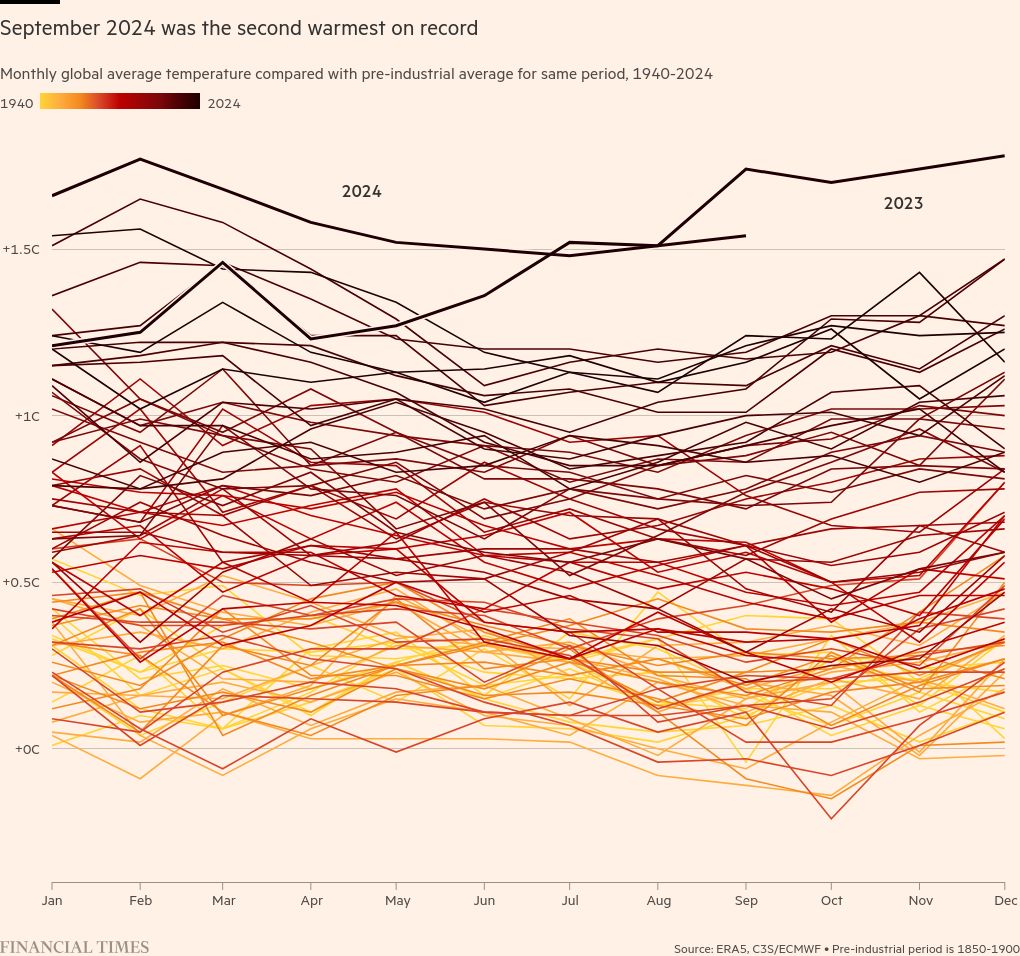
This article is an on-site version of our Europe Express newsletter. Premium subscribers can sign up here to get the newsletter delivered every weekday and Saturday morning. Standard subscribers can upgrade to Premium here, or explore all FT newsletters
Good morning. Today our parliament correspondent previews the Hungary-on-Hungary battle of words in Strasbourg, and our finance correspondent reports on the procedural steps that begin today to take a €35bn loan for Ukraine from idea to reality.
Face-off
Domestic Hungarian politics will take over the European parliament today as a speech by prime minister Viktor Orbán is poised to turn into a rare opportunity for his most potent foe to take him on, writes Andy Bounds.
Context: Hungary holds the rotating presidency of the EU, and tradition dictates that the presiding country’s leader addresses the Strasbourg assembly. Péter Magyar, whose Tisza party took several seats from Orban’s Fidesz in June’s European elections, will be among the MEPs speaking in response.
Orbán has largely plied Hungary’s media and parliament to his will, rarely facing opposition at home. The European parliament, by contrast, frequently denounces him.
“[In his speech] he will present himself as a competent and strong council presidency . . . but he will stay silent about the corruption, the total state capture, his 24-hour propaganda machinery and his authoritarian chokehold on virtually every aspect of the Hungarian society,” said Tineke Strik, Green MEP and rapporteur on the rule of law in Hungary for the European parliament.
The European Commission last year unblocked €10bn — about a third of EU funds destined for Hungary but frozen over rule of law concerns — causing howls of outrage.
Magyar will focus on domestic issues, hoping to reach some of those watching back home. Aides say he will mention the poor healthcare standards, and charge that Orbán is filling the pockets of cronies rather than financing public services.
Magyar was once an acolyte of Orbán, but split when his now ex-wife, the former justice minister Judit Varga, was forced to resign over the controversial pardon of a convicted criminal.
Orbán has friends in parliament, too: His Patriots political family has 83 MEPs and is the third-largest group.
They have already targeted Magyar, whose party has joined the centre-right European People’s party (EPP), accusing him of theft. Hungary’s chief prosecutor has charged Magyar for throwing the phone of someone who was filming him at a nightclub into the Danube.
Magyar claims the charges are politically motivated. “This is because our party, Tisza, is polling head-to-head with Fidesz . . . each and every one of their fabricated cases have failed,” Magyar said in a statement.
Parliament’s legal affairs committee will now assess whether Magyar’s immunity should be lifted over the affair.
Chart du jour: Wet hot

Rising global temperatures helped drive “extreme rainfall events” around the world in September, including deadly floods in Poland, the Czech Republic, Slovakia and Austria.
Under pressure
A majority of EU countries is set to approve the bloc’s share of a G7 loan to Ukraine, but US participation is still uncertain, writes Paola Tamma.
Context: Last month, the European Commission proposed to issue a loan of up to €35bn, on the back of future profits arising from immobilised Russian state assets. Contributions from Canada, Japan and the UK would bring the total to about $50bn, the amount agreed by G7 leaders in June.
But one big country is missing.
The US has made its participation conditional on an extension of EU sanctions, which currently need renewal every 6 months, to three years. “The scale of our participation depends on the strength of EU assurances that the Russia reserves will remain immobilised,” a US official said.
While a wide majority of member states are expected to approve the EU share of the loan today, extending the sanctions regime requires a unanimous decision, and Hungary has said it wants to wait for the result of US elections on November 5.
“We believe this issue should be decided after the US elections. We have to see in which direction the future US administration is going on this issue,” said Hungary’s finance minister Mihály Varga.
The issue is likely to be discussed by EU leaders next week, who could pile pressure on Hungary’s Viktor Orbán to relinquish his veto on extending EU sanctions — allowing the US to join in after all.
“He’ll have a lot of pressure from member states, from the [European] commission, and hopefully they have a lot of pressure from the US as well,” said an EU diplomat.
The European parliament still needs to approve the loan as well, which is expected later this month.
What to watch today
-
Hungarian Prime Minister Viktor Orbán gives a speech at the European parliament in Strasbourg.
-
Czech and Polish governments hold a joint meeting in Prague.
Now read these
-
Spread your wings: Ukraine is considering lifting a ban on drone exports to boost its industry and generate up to $20bn from sales abroad.
-
European M&A: Dealmaking is back but the risk is no longer that banks are “too big to fail” but “too small to deliver”, writes Carlos Torres Vila.
-
To infinity, and beyond: Despite a failure to meet past expectations, the space-tourism sector still bubbles with enthusiasm. Why?
Recommended newsletters for you
Trade Secrets — A must-read on the changing face of international trade and globalisation. Sign up here
Swamp Notes — Expert insight on the intersection of money and power in US politics. Sign up here
Are you enjoying Europe Express? Sign up here to have it delivered straight to your inbox every workday at 7am CET and on Saturdays at noon CET. Do tell us what you think, we love to hear from you: [email protected]. Keep up with the latest European stories @FT Europe